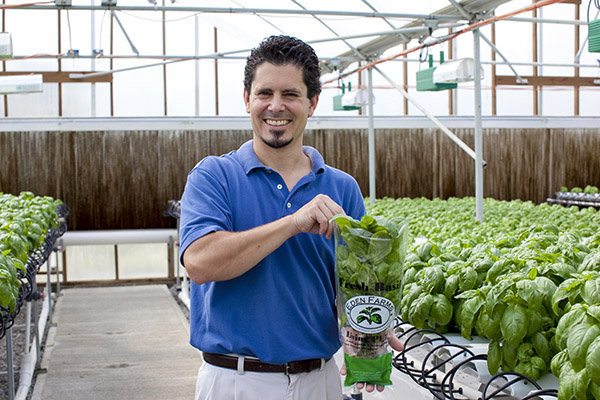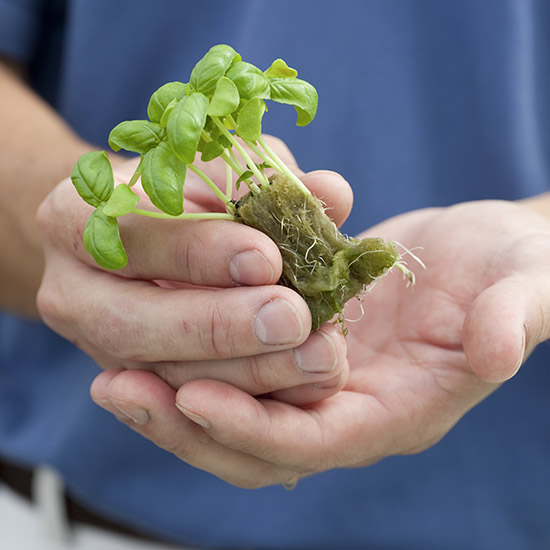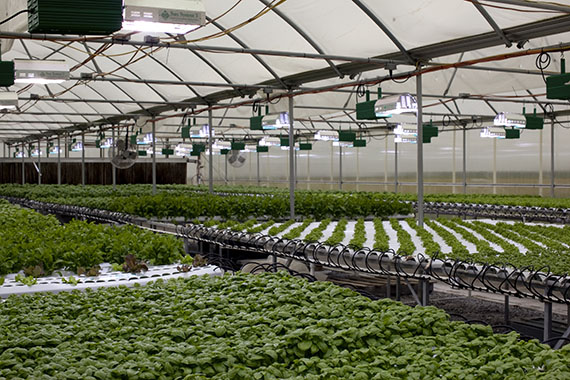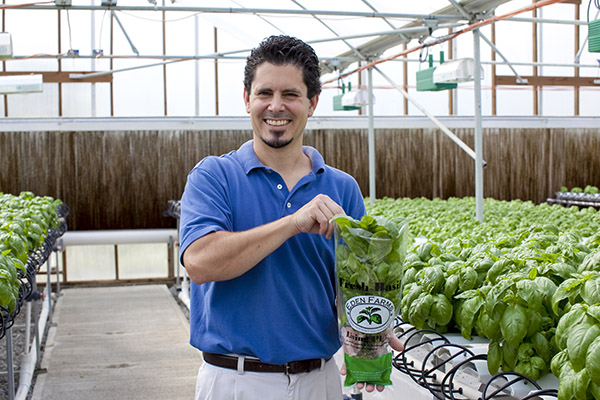Originally published in Issue 3
Randy Butts spent 10 years working as an engineer before he made the decision to do what he really wanted to do—become a grower.
Randy Butts started Eden Farms Inc. in Lebanon, Ind., in August 2006. Before starting his hydroponic greenhouse operation he got sidetracked for 10 years working as an engineer in the automation and controls industry.
“I always wanted to move beyond the engineering field and work for myself,” Butts said. “I had a deep-seated love of agriculture. For a period of time I did some traditional farming. I worked for a farmer who produced corn and soybeans.
“Unfortunately, there’s no easy avenue to get started in traditional farming today. You don’t just go out and buy acres of land and $200,000 tractors to farm it.”
Because of the limitations he encountered with traditional farming, Butts started researching hydroponics.

Photos courtesy of Eden Farms, Inc.
“I had some friends who grew hydroponic tomatoes in the ’90s and it always kind of fascinated me,” he said. “It was kind of a marriage of my love of technology and my love of agriculture that I put together and started my own hydroponic operation.”
Butts got his business started by purchasing 5,000 square feet of greenhouses on eBay.
“They were Crop King greenhouses that I took down from the company’s facility in Seville, Ohio, and moved to Lebanon,” he said. “I left my engineering job and jumped in with both feet. And yes, I had people ask me if I was nuts. I felt I had to give it 100 percent if I was going to make it work. It has worked out, but not without its ups and downs along the way.”
Beginning with basil
When Butts started his hydroponic operation he began growing ‘Genovese’ basil in nutrient film technique channels.
“I worked with American Hydroponics on designing my system,” he said. “I was advised to start with basil rather than trying to mix the crop since I only had one reservoir for the nutrients. To try to mix crops and grow them all with one nutrient mix, the people at American Hydroponics felt it would be a major challenge for me to take on. They advised me to start with just basil. Another reason I chose basil was that it could withstand the heat of the summer.”
Butts marketed the basil primarily through wholesale distributors that shipped the product throughout the Midwest states.
“At that time my product was new enough that it garnered a lot of interest in the retail market,” he said. “Initially all of the basil I was growing was sold to wholesalers for retail distribution as living basil plants in a floral type sleeve. Most of the basil was sold to grocery stores.”

Crop diversification
Butts began to look at other crops in 2009 when he lost a major local customer that switched herb suppliers.
“That customer represented a major portion of my sales so I had to diversify quickly to basically stay in business,” he said. “Arugula and watercress are similar to the basil in production. I had trialed them and had talked to another grower who was doing this combination of crops. The watercress was an easier sell than the arugula. I had picked up a food service distributor that sold the watercress to restaurants that just love local living watercress.”
Butts said he has continued to diversify his crop mix.
“Basil is still the major crop at the Lebanon facility, but we have a large section of lettuce growing,” he said. “We also have a large section of mixed greens, kale, various herbs, bok choy, mustard greens, collards, green and red sorrel and tatsoi. All of those crops are sold at farmers markets.”
Even though Butts has expanded the number of crops being grown, he still operates with only one fertilizer reservoir.
“I started experimenting with the crops to see if I could grow them on the one reservoir,” he said. “We made a few adjustments and have been able to find a nice balance that lets us grow all the crops on one nutrient mix. Bibb lettuce and some of the other lettuces were the crops that were the hardest to learn how to grow. They are the most sensitive to the nutrient mix.
[adrotate banner=”23″]
Expanding production
With his 5,000-square-foot greenhouse sitting on 5 acres of land, Butts began in 2009 to look at expanding his production facilities.
“We were on the verge of expanding here and then we started to run into problems with the county on zoning regulations,” he said. “Zoning officials wanted us to be zoned as commercial rather than agriculture. They didn’t understand what we were doing and couldn’t see the operation as agriculture. They put in a regulation that in order for a business to be classified as agriculture or a farm it had to have a minimum of 20 acres of land. Since I only owned 5 acres, Eden Farms couldn’t be designated a farm.”
At the same time that Butts was seeking to expand his Lebanon operation, he began looking at an abandoned tomato greenhouse operation in Raleigh, Ill.

“We started growing in this 22,000- square-foot greenhouse that we began leasing last year,” he said. “It was a greenhouse tomato facility in the 1990s that had been left to deteriorate. The tomatoes had been produced in grow bags, but we went in and retrofitted the houses for a deep water culture system. There are no longer any tomatoes. We are currently using half of the production space available. The majority of it is being used for lettuce, including bibb, oak leaf and lolla rossa varieties.”
One of the benefits of the Illinois facility is the availability of methane gas for heating the greenhouses.
“Our landlord, who is the same person who originally grew the tomatoes, extracts methane gas from abandoned coal mines. That is our heat source,” Butts said. “Our heat, which is included in our lease, is provided 100 percent from reclaimed methane gas.”
In addition to the lettuce crops at the Illinois operation, Butts is also growing smaller quantities of basil, watercress and arugula and a few other miscellaneous crops.
“We are trialing other crops because we want to try growing them in the raft production system,” he said. “We want the Illinois facility to be able to produce a large volume of one or two commodities. The raft system lends itself better to that type of production than the NFT channels do. Channels can do it, but there is more labor involved with moving them. With the raft system we are working from ends of the pond to either transplant or harvest. There is an efficiency gained with the raft system if one large crop is grown. Pushing bibb lettuce through the pond is very efficient. If you are trying to grow multiple crops, like we are doing in Lebanon, it’s more difficult.”
Even with the additional production space available at the Illinois facility, Butts hasn’t given up on his plans to expand production at his Lebanon location.
“I think I learned a lot from the last zoning experience to the point that I would approach it differently,” he said. “There is a possibility down the road of increasing production in Lebanon to make use of the land that is still available.
Expanding markets
Butts said he is actively working to find new customers.
“With the Illinois facility coming on board and the amount of production that we are able to produce there, we are looking for new customers and markets,” he said. “The crops being grown in Illinois are being sold through distributers. We also have some direct distribution to a Kroger warehouse in Louisville.”
This is the second summer that Butts will be selling at farmers markets. Crops are also sold at the farmers markets during the winter.
“We added a new market this summer that is doing great for us,” he said. “Once people start to see our product in the marketplace, we have had requests from three or four other farmers markets. Trying to have a stand at each one, we just can’t do them all. We have developed a lot of relationships with regular customers at these markets. They come back week after week for our products.”
Butts said the majority (65-70 percent) of the produce he grows is sold through distributors. Twenty percent goes through the farmers markets, and 10-15 percent is sold directly to grocery stores and restaurants.
“I would like to have more direct distribution to grocery stores rather than relying on the distributors,” he said. “Once the product is delivered to the distributors, it’s out of our control and that is not always the best situation. And our return on selling direct is also higher.”
Every crop that Butts is producing can be grown year-round, except for spinach.
“Spinach is the only seasonal crop that we have right now,” he said. “We have a difficult time growing spinach through the summer. Through late winter it grows very well. Everything else we try to keep producing year-round so there is a consistency to our offerings.”
For more: Eden Farms Inc., (765) 676-5239; randy@edenfarmsinc.com; http://www.edenfarmsinc.com.
David Kuack is a freelance technical writer in Fort Worth, Texas; dkuack@gmail.com.


